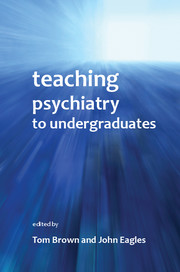Book contents
- Frontmatter
- Contents
- List of figures, tables and boxes
- List of contributors
- Preface
- Foreword
- 1 How do students learn?
- 2 Recent developments in undergraduate medical education
- 3 Undergraduate psychiatry teaching – the core curriculum
- 4 The organisation of undergraduate teaching
- 5 Assessment of undergraduates in psychiatry
- 6 Using computers to teach undergraduate psychiatry
- 7 How to give a lecture
- 8 How to do small-group teaching
- 9 Problem-based learning
- 10 Teaching trainee psychiatrists how to teach medical students: the Southampton model
- 11 Involving trainees in teaching
- 12 Involvement of service users in psychiatric education
- 13 Time-efficient clinical teaching
- 14 Intercalated degrees
- 15 Undergraduate experiences of psychiatry: a student view
- 16 Integration: teaching psychiatry with other specialties
- 17 Teaching the teachers in a cross-cultural setting: the Scotland–Malawi Mental Health Education Project
- 18 International undergraduate teaching
- 19 Teaching with simulated patients and role-play
- 20 Undergraduate medical education and recruitment to psychiatry
- 21 Choosing psychiatry: factors influencing career choice among foundation doctors in Scotland
- 22 Funding of the teaching of medical undergraduates
- 23 Dealing with students in difficulty
- 24 Training medical students to promote good mental health in secondary schools
- 25 Women in medicine
- Index
5 - Assessment of undergraduates in psychiatry
Published online by Cambridge University Press: 02 January 2018
- Frontmatter
- Contents
- List of figures, tables and boxes
- List of contributors
- Preface
- Foreword
- 1 How do students learn?
- 2 Recent developments in undergraduate medical education
- 3 Undergraduate psychiatry teaching – the core curriculum
- 4 The organisation of undergraduate teaching
- 5 Assessment of undergraduates in psychiatry
- 6 Using computers to teach undergraduate psychiatry
- 7 How to give a lecture
- 8 How to do small-group teaching
- 9 Problem-based learning
- 10 Teaching trainee psychiatrists how to teach medical students: the Southampton model
- 11 Involving trainees in teaching
- 12 Involvement of service users in psychiatric education
- 13 Time-efficient clinical teaching
- 14 Intercalated degrees
- 15 Undergraduate experiences of psychiatry: a student view
- 16 Integration: teaching psychiatry with other specialties
- 17 Teaching the teachers in a cross-cultural setting: the Scotland–Malawi Mental Health Education Project
- 18 International undergraduate teaching
- 19 Teaching with simulated patients and role-play
- 20 Undergraduate medical education and recruitment to psychiatry
- 21 Choosing psychiatry: factors influencing career choice among foundation doctors in Scotland
- 22 Funding of the teaching of medical undergraduates
- 23 Dealing with students in difficulty
- 24 Training medical students to promote good mental health in secondary schools
- 25 Women in medicine
- Index
Summary
Introduction
Most, if not all, of those involved in teaching medicine have probably encountered a variant on the question ‘Will this be in the exam?’ It is understandable that with students facing a high-stakes examination, which influences progress through a career path, they will choose to focus their energies on those aspects of the course that will be assessed. There can be no more accurate truism in medicine than ‘assessment drives learning’. With this in mind, it is evident that, whatever the focus of a course, if assessment is not at the centre of planning the curriculum, efforts to direct student learning will fail. Newble & Kaeger (1983) describe how laudable aims for a curriculum can fail to be met when assessment is not structured to direct student learning down a desired route.
It is easy to become nihilistic when faced with an awareness that students will choose to focus on what is examined. Yet if all of us were honest, we would realise that they are only repeating our own patterns of behaviour. It is therefore our duty to see this not as an impediment but as an opportunity. With appropriately shaped assessment built into a curriculum, students will be directed down a chosen learning path and appropriate attributes developed. Assessment then becomes central to any curriculum, not as an end in itself but as a signpost and driver to excellence.
Despite reflective educators recognising similarities between current students’ views and their own student experience, another common experience for those who have been involved in ‘new’ implementations of assessment is hearing that familiar plaintive cry of clinicians, ‘But it was good enough for me …’. Changes in assessment methods can induce mistrust and alarm in those who deliver teaching and unless they can be encouraged to see the point of the chosen method of assessment these, usually, well meaning teachers can derail the process and purpose of assessment by communicating their views, consciously or unconsciously, to students. Concern is usually about standards purportedly falling, along with the bar for success. With the media and politicians constantly playing such a populist card, it should be no surprise to find this concern among colleagues in medicine.
- Type
- Chapter
- Information
- Teaching Psychiatry to Undergraduates , pp. 52 - 65Publisher: Royal College of PsychiatristsPrint publication year: 2011



